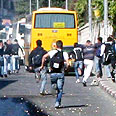
Report: 35,000 east Jerusalem students don't attend public schools
Ir Amim foundation, Civil Rights Association release report indicating some 30,000 students forced to attend private schools due to shortage of 1,000 classrooms; 5,000 teens, children not educated at all. Report also suggests classrooms not up to par. Jerusalem Municipality strongly rejects data, claiming report is falsified
Roughly 35,000 east Jerusalem students will not begin the new school year on Tuesday in municipality schools, a Civil Rights Association and Ir Amim foundation report suggests.
The reason for this, as stated in the report, is a shortage of 1,000 classrooms in east Jerusalem which grows bigger with each passing year. By 2011 the shortage is expected to reach about 1,500 new classrooms. The Jerusalem Municipality rejects the report's data calling it is falsified.
These are private schools or informal establishments being activated by private companies, churches, the Waqf, the United Nations and various Palestinian elements.
The report also indicates that among those who attend the city's educational system, thousands are forced to study in classrooms and rented buildings unfit for studies, small rooms with no ventilation and no playground yards. This condition of the classrooms has been so for years and gets worse with each year.
Half of the classrooms activated by the Jerusalem Municipality in the city's eastern neighborhoods are below standards: 704 below-par classrooms as opposed to 656 up-to-standard classrooms. Among the below-standard classrooms, 221 are within facilities "in unfit condition."
The report also raises issues regarding the students' registration to the schools and reveals that in some eastern Jerusalem establishments various service payments are being charged upon registration illegally. These payments, which at times amount to hundred of shekels take a heavy toll on residents, many of them needy. This is due to the fact that 67% of east Jerusalem's families are considered poor.
'No preference for east Jerusalem'
Ir Amim Director-General Yehudit Oppenheimer said, "We call upon the government of Israel to recognize the importance of the issue of education in eastern Jerusalem and to give it priority in dividing the Education Ministry's budget in order for proper budgets to be quickly and efficiently allocated."Oppenheimer further stated that education reforms in other locations in Israel are given preference over securing the most basic of rights for free public education in east Jerusalem. "Until the gap in missing classes is closed the State must pay back the tuition payments to parents who are forced to send their children to private schools," Oppenheimer added.
Attorney Tali Nir from the Civil Rights Association stated, "For many years the authorities acted against the law by promising to address major malfunctions in the urban education system in eastern Jerusalem, which are described in the report. Denying a child from his basic right for education is a very serious offence to his basic rights of development and self fulfillment."
Nir added that the children of east Jerusalem suffer irreversible damage to their development as a result of the current situation and called for the cessation of "the continuing tragedy in east Jerusalem's education system."
Official Responses
The Jerusalem Municipality said in response, "We strongly protest the falsified data which appear in the report. It highlights ringing headlines while trying to deceive the public. The city is aware of the educational needs in east Jerusalem and has devised a multi-year program for building educational establishments together with the government, which is in responsible for the budgets."
The statement continued, "Following great efforts, gaps in the education system in Jerusalem, on all of it parts, are slowly closing, contrary to the data presented in the falsified report."
The municipality statement regarding the actual data read, "It is important to note that over the last two years several new schools were built which contain 200 new classrooms. In addition, the city is promoting the allocation of grounds for schools as part of a program which is adjusted to the needs of the population."
The Education Ministry responded, "In the last school year three new schools were opened in east Jerusalem, which contain 42 classrooms. As part of a joint program with the Jerusalem Municipality the ministry secured 80 classrooms to be built. Building is conditioned with land confiscation performed by the Municipality and after this process is completed, the ministry will issue planning programs as soon as possible."
The statement further said that the ministry was unaware of students that are not assigned within the education system.
Ronen Medzini contributed to the report















